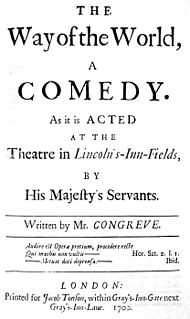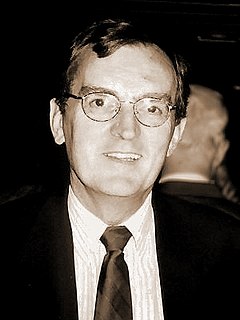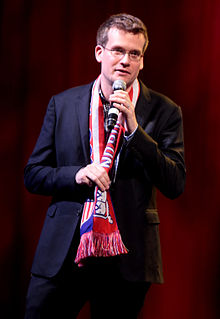John Booker may refer to:
John Booker may refer to:
Communion may refer to:
Matthew may refer to:
Wired may refer to:
Imagine may refer to:
The meaning of life pertains to the significance of living or existence in general.

The John Newbery Medal, frequently shortened to the Newbery, is a literary award given by the Association for Library Service to Children (ALSC), a division of the American Library Association (ALA), to the author of "the most distinguished contributions to American literature for children". The Newbery and the Caldecott Medal are considered the two most prestigious awards for children's literature in the United States. Books selected are widely carried by bookstores and libraries, the authors are interviewed on television, and master's and doctoral theses are written on them. Named for John Newbery, an 18th-century English publisher of juvenile books, the winner of the Newbery is selected at the ALA's Midwinter Conference by a fifteen-person committee. The Newbery was proposed by Frederic G. Melcher in 1921, making it the first children's book award in the world. The physical bronze medal was designed by Rene Paul Chambellan and is given to the winning author at the next ALA annual conference. Since its founding there have been several changes to the composition of the selection committee, while the physical medal remains the same.

In literature, an epigraph is a phrase, quotation, or poem that is set at the beginning of a document, monograph or section thereof. The epigraph may serve as a preface to the work; as a summary; as a counter-example; or as a link from the work to a wider literary canon, with the purpose of either inviting comparison or enlisting a conventional context.
Letter, letters, or literature may refer to:

John Derbyshire is a British-born American paleoconservative political commentator, writer, journalist and computer programmer. He formerly wrote a column in National Review before moving to a staff position at the website VDARE, where he continues to work. He has also written for the New English Review. His columns cover a broad range of political-cultural topics, including immigration, China, history, mathematics, and race. Derbyshire's 1996 novel Seeing Calvin Coolidge in a Dream was a New York Times "Notable Book of the Year". His 2004 non-fiction book Prime Obsession won the Mathematical Association of America's inaugural Euler Book Prize. A political book, We Are Doomed: Reclaiming Conservative Pessimism, was released in September 2009.
An autobiography is a book or other work about the life of a person, written by that person.

"Candle in the Wind 1997", also known as "Goodbye England's Rose" and "Candle in the Wind '97", is a song by Elton John and Bernie Taupin, a re-written and re-recorded version of their 1973 song "Candle in the Wind". It was released on 13 September 1997 as a tribute single to Diana, Princess of Wales, with the global proceeds from the song going towards Diana's charities. In many countries, it was pressed as a double A-side with "Something About the Way You Look Tonight". It was produced by Sir George Martin.
How may refer to:
Fourth dimension may refer to:

Progress and Poverty: An Inquiry into the Cause of Industrial Depressions and of Increase of Want with Increase of Wealth: The Remedy is an 1879 book by social theorist and economist Henry George. It is a treatise on the questions of why poverty accompanies economic and technological progress and why economies exhibit a tendency toward cyclical boom and bust. George uses history and deductive logic to argue for a radical solution focusing on the capture of economic rent from natural resource and land titles.

John Michael Green is an American author, YouTube content creator, and podcaster. He won the 2006 Printz Award for his debut novel, Looking for Alaska, and has had several of his subsequent books debut at number one on The New York Times Best Seller list, including his most popular novel, The Fault in Our Stars. The 2014 film adaptation of The Fault in Our Stars opened at number one at the box office and was a commercial and critical success. In 2014, Green was included in Time magazine's list of The 100 Most Influential People in the World. Another film based on a Green novel, Paper Towns, was released on July 24, 2015.
Zechariah most often refers to:
"Keep Your Eyes on the Prize" is a folk song that became influential during the American Civil Rights Movement of the 1950s and 1960s. It is based on the traditional song, "Gospel Plow," also known as "Hold On," "Keep Your Hand on the Plow," and various permutations thereof.
John is a common English name and surname:

William Henry "Hank" Green II is an American vlogger, science communicator, entrepreneur, author, internet producer, and musician. He is known for producing the YouTube channel Vlogbrothers with his older brother, author John Green, as well as for creating and hosting the educational YouTube channels Crash Course and SciShow. He has also advocated for and organized social activism, created and hosted a number of other YouTube channels and podcasts, released music albums, and amassed a large following on TikTok.

Teetotalism is the practice or promotion of total personal abstinence from alcoholic beverages. A person who practices teetotalism is called a teetotaler or is simply said to be teetotal. The teetotalism movement was first started in Preston, England, in the early 19th century. The Preston Temperance Society was founded in 1833 by Joseph Livesey, who was to become a leader of the temperance movement and the author of The Pledge: "We agree to abstain from all liquors of an intoxicating quality whether ale, porter, wine or ardent spirits, except as medicine." Today, a number of temperance organizations exist that promote teetotalism as a virtue.